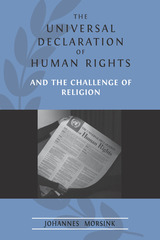
In this new century, born in hope but soon thereafter cloaked in terror, many see religion and politics as a volatile, if not deadly, mixture. For All Peoples and All Nations uncovers a remarkable time when that was not so; when together, those two entities gave rise to a new ideal: universal human rights.
John Nurser has given life to a history almost sadly forgotten, and introduces the reader to the brilliant and heroic people of many faiths who, out of the aftermath of World War II and in the face of cynicism, dismissive animosity, and even ridicule, forged one of the world's most important secular documents, the United Nations's Universal Declaration of Human Rights. These courageous, persistent, visionary individuals—notable among them an American Lutheran Seminary professor from Philadelphia, O. Frederick Nolde—created the Commission on Human Rights. Eventually headed by one of the world's greatest humanitarians, Eleanor Roosevelt, the Universal Declaration has become the touchstone for political legitimacy.
As David Little says in the foreword to this remarkable chronicle, "Both because of the large gap it fills in the story of the founding of the United Nations and the events surrounding the adoption of human rights, and because of the wider message it conveys about religion and peacebuilding, For All Peoples and All Nations is an immensely important contribution. We are all mightily in John Nurser's debt." If religion and politics could once find common ground in the interest of our shared humanity, there is hope that it may yet be found again.

Repulsed by evil Nazi practices and desiring to create a better world after the devastation of World War II, in 1948 the UN General Assembly adopted the Universal Declaration of Human Rights (UDHR). Because of the secular imprint of this text, it has faced a series of challenges from the world’s religions, both when it was crafted and in subsequent political and legal struggles.
The book mixes philosophical, legal, and archival arguments to make the point that the language of human rights is a valid one to address the world’s disputes. It updates the rationale used by the early UN visionaries and makes it available to twenty-first-century believers and unbelievers alike. The book shows how the debates that informed the adoption of this pivotal normative international text can be used by scholars to make broad and important policy points.

Johannes Morsink argues that the 1948 UN Universal Declaration of Human Rights and the human rights movement today are direct descendants of revulsion to the Holocaust and the desire to never let it happen again.
Much recent scholarship about human rights has severed this link between the Holocaust, the Universal Declaration, and contemporary human rights activism in favor of seeing the 1970s as the era of genesis. Morsink forcefully presents his case that the Universal Declaration was indeed a meaningful though underappreciated document for the human rights movement and that the declaration and its significance cannot be divorced from the Holocaust. He reexamines this linkage through the working papers of the commission that drafted the declaration as well as other primary sources.
This work seeks to reset scholarly understandings of the Universal Declaration of Human Rights and the foundations of the contemporary human rights movement.
READERS
Browse our collection.
PUBLISHERS
See BiblioVault's publisher services.
STUDENT SERVICES
Files for college accessibility offices.
UChicago Accessibility Resources
home | accessibility | search | about | contact us
BiblioVault ® 2001 - 2024
The University of Chicago Press









